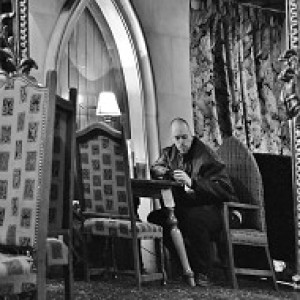Guns & Butter
Following the stubborn but ultimately futile defence of Mons on the 23rd of August, the priority of the British and French armies was to quickly withdraw south to another defensible position, and to avoid being completely routed by the advancing Germans as they retreated. On a map, this all translates into some nice squiggly lines augmented by many a dramatic arrow, but on the ground, soldiers simply found themselves marching from dawn until well after sundown following often-confusing directions, snatching sleep in short bursts, eating biscuits and water supplemented by bully beef from seven-pound tins which were always emptied and shared out all at once (the tins being too heavy to carry individually on the march on top of other equipment, and thus transported en masse in carts). The roads were congested with Belgian refugees, sometimes pushing their possessions along in dogcarts, and being weighed down with a hundred pounds of gear in late summer heat wearing stiff, heavy army boots, troops were soon marching on swollen and bloody feet. Their progress slowed inexorably, and fighting a major rearguard action against the Germans was inevitable.
On the 25th, along a front stretching from Cambrai to Le Cateau, II Corps of the BEF - the half of the expeditionary force which had fought at Mons two days earlier - organised itself to face the German advance again. Private Charles Ditcham of the 2nd Battalion, Argyll & Sutherland Highlanders was one of them:
On the night of the 25th at one in the morning my battalion went into a factory in the village of Le Cateau. And at four o'clock we moved out hurriedly because the German Uhlans were at the other end of the village. So we took up our position to do a rearguard action for the Expeditionary Force. All this meant was that the company was put in a cornfield and we were told to dig ourselves in. So we just made a bit of a hole in the ground with your trenching tool and then took up a position. Then the party started when the Hun came along. It was what made me realise what war was about.
We just lined up in the cornfield, one company on the right, one company on the left, Middlesex and other people, all mixed up. And these Germans came in their hordes and were just shot down. But they still kept coming. There were sufficient of them to shove us out of the field eventually. And then, the realisation what war meant: when I saw my company sergeant-major for instance, a fellow called Sim, who was wounded in the mouth. He was going back dripping blood. And there were various people getting killed and wounded.
And afterwards, according to later accounts, it was an orderly retreat. Well, as one who took part in the orderly retreat, I didn't think it was very orderly. On my way out I met another drummer and on our way back we met the corporal of the drums, a fellow called Balfour. And this chap had been very badly wounded so we took him back to the aid post in a church in the village of Le Cateau. When we arrived, it gave me the shock of my life to see all the badly wounded people there; there were stretcher cases and walking cases, the church was full of them. So we left this wounded fellow and just followed the tribe, I didn't know where it was going.
Ditcham managed to climb onto a Clydesdale horse which had been unharnessed from an ammunition wagon, and rode it into St Quentin, thirty kilometres south-west of Le Cateau, by the following morning. By the time he dismounted, he could hardly walk.
The stand at Le Cateau played out much the same way as the Battle of Mons, with British forces holding off German assaults for as long as possible before being forced back by superior numbers; however, this time it was at a far greater cost. Of forty thousand British troops fighting, nearly eight thousand were lost, and it would have been far worse but for the intervention of French cavalry and Territorials protecting the battered British flank as it retreated. The BEF regrouped at St Quentin having bought a few days' respite from German attacks, but lost more men in a day than Wellington's army at Waterloo.
The new war was beginning to take its toll.
- 0
- 0
- Nikon D3100
- f/5.3
- 42mm
- 3200

Comments
Sign in or get an account to comment.


